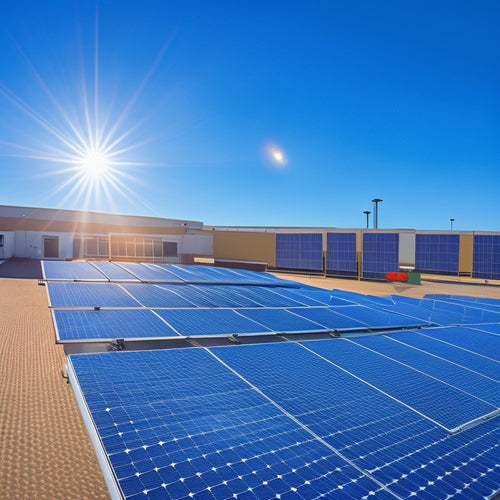
Solar Power Battery Backup for Home
Share
When investing in a solar power battery backup for your home, you guarantee a reliable energy supply during blackouts, protecting your food, electronics, and family comfort. With a seamless shift to off-grid power, you'll maintain a steady energy supply for essential appliances, communication devices, and lights. Silent operation at night and energy independence during outages provide peace of mind. Deep cycle battery design, capacity ratings, and longer cycle life assurances are key considerations for peak performance. By understanding these factors, you'll be enabled to choose the right system for your needs and maximize its benefits - investigate the details to enhance your energy independence.
The Essentials
- Solar power battery backup ensures energy availability during blackouts, preventing food spoilage and protecting electronics from damage.
- Backup power systems deliver electricity during extended outages, guaranteeing a steady energy supply for essential appliances and devices.
- Solar power systems facilitate a seamless shift to off-grid power, utilizing excess energy from solar panels for backup supply and ensuring energy independence.
- Deep cycle battery design is crucial for solar power backup systems, with cycle life determining performance and longevity of the battery.
- Capacity calculations should consider depth of discharge, temperature, and charging/discharging cycles to determine the minimum capacity required for energy needs.
Reliable Power During Outages
You rely on a steady supply of electricity to power your home, but grid outages can leave you in the dark.
With a solar power battery backup, you'll have power when you need it, even during blackouts. This backup system guarantees you have a reliable source of energy, providing peace of mind and keeping your essential appliances running.
Additionally, it prevents costly losses due to food spoilage and damage to electronics, and safeguards your family's comfort and well-being by keeping lights, internet, and communication devices powered on.
Power When You Need
During extended power outages, backup power systems prove their worth by supplying reliable electricity when it's needed most. You can rest easy that your home remains powered, even when the grid fails.
A solar power battery backup system guarantees you have a steady supply of energy, giving you the independence you crave. With a reliable source of power, you can prevent data loss and damage to your sensitive electronics, guaranteeing Uninterruptible Power Supply during unexpected blackouts.
You'll also have the added benefit of staying connected and productive, even when the grid goes down. With a backup system, you're no longer at the mercy of the grid. You can continue to live your life as usual, enjoying the comforts of home without interruption.
This means you can keep your lights on, your refrigerator running, and your medical equipment powered. You'll also have the peace of mind that comes with knowing your home is secure, even in the dark.
Backup During Blackouts
With grid failures becoming increasingly common, having a reliable backup power system in place is essential for maintaining a steady flow of electricity. You can't afford to be left in the dark when the grid goes down.
A solar power battery backup system provides you with a seamless shift to off-grid power during outages, ensuring your home remains powered and comfortable. By utilizing excess energy generated by your solar panels during the day Renewable Energy Storage, you can reduce your reliance on the grid and enjoy a seamless backup power supply.
When the grid fails, your solar power system kicks in, providing you with energy independence. You'll have the freedom to power your essential appliances, lights, and devices without relying on the grid. This means you can continue to work, cook, and live life as usual, even when the neighbors are left in the dark.
With a solar power battery backup, you'll have a reliable source of power during extended outages. You can charge your devices, keep your refrigerator running, and maintain a sense of normalcy during chaotic times.
Silent Operation at Night
You'll appreciate the silent operation of your solar power battery backup system at night, as it provides a quiet nighttime energy supply without disrupting your daily routine.
With residential energy storage systems, you can enjoy peace of mind knowing that you're prepared for power outages and grid failures home battery backup system.
This is made possible by the system's ability to store energy during the day and supply it to your home when the sun goes down.
Quiet Nighttime Energy Supply
As the sun sets and darkness falls, your solar power battery backup system quietly takes over, guaranteeing a seamless and uninterrupted energy supply throughout the night. This silent operation is made possible by the system's advanced technology, which prioritizes energy efficiency and noise reduction.
You can rest assured that your home remains powered without the hum of noisy generators or the reliance on grid electricity.
In fact, your solar power battery backup system is designed to optimize energy efficiency during nighttime hours. By storing excess energy generated during the day, the system can supply your home with clean, renewable energy when the sun isn't shining.
This reduces your reliance on fossil fuels and minimizes your carbon footprint. Furthermore, the system's silent operation guarantees that you can enjoy the peace and quiet of the night, free from the distraction of noisy machinery.
With your solar power battery backup system, you can experience the freedom of energy independence, without sacrificing performance or convenience.
Energy Storage at Dusk
During the twilight hours, your solar power battery backup system springs into action, utilizing the excess energy generated throughout the day to store it for later use. This is when the system's energy storage capabilities truly shine, providing you with a reliable source of power when you need it most.
As the sun dips below the horizon, your solar panels' energy production slows, and your battery backup system takes over, silently supplying your home with electricity. This seamless shift guarantees that you can enjoy the comforts of your home, even when the grid is down or during peak energy usage hours.
Here's a breakdown of how your solar power battery backup system operates during the twilight hours:
| Time of Day | Energy Source | System Operation |
|---|---|---|
| Daytime | Solar Panels | Energy Generation and Storage |
| Twilight | Battery Backup | Energy Storage and Supply |
| Nighttime | Battery Backup | Silent Energy Supply |
| Peak Hours | Battery Backup | Supplemental Energy Supply |
| Grid Outage | Battery Backup | Primary Energy Supply |
With your solar power battery backup system, you can rest confident that you'll have a reliable source of energy, no matter the time of day or the state of the grid. This means you can enjoy the freedom and energy independence you deserve.
Deep Cycle Battery Design
You're now considering the design of your deep cycle battery, which is critical to your solar power battery backup system.
With the rise of residential solar batteries, it's crucial to understand the importance of home solar battery systems in ensuring a reliable backup power solution.
The battery's cycle life, or the number of charge and discharge cycles it can handle, will greatly impact its overall performance and lifespan.
You'll need to choose from various cell chemistry options, such as lead-acid, lithium-ion, or nickel-cadmium, each with its own advantages and limitations.
Battery Cycle Life
In conjunction with its overall lifespan, a deep cycle battery's cycle life considerably impacts its performance and reliability in a solar power battery backup system. You need to understand that a deep cycle battery's cycle life refers to the number of charge and discharge cycles it can handle before its capacity degrades. A higher cycle life means you'll get more use out of your battery, reducing the need for frequent replacements.
When selecting a deep cycle battery, look for one with a high cycle life rating. This is especially important if you plan to use your solar power battery backup system regularly.
Proper battery maintenance, such as monitoring charging efficiency and avoiding deep discharging, can also help extend the cycle life of your battery. Additionally, choosing a battery with a built-in battery management system (BMS) can help prevent overcharging and over-discharging, which can reduce the battery's cycle life.
Cell Chemistry Options
Three primary cell chemistry options are available for deep cycle battery design in solar power battery backup systems: flooded lead-acid, sealed lead-acid, and lithium-ion. Each has its advantages and disadvantages, which you should consider when selecting the right battery for your needs.
| Cell Chemistry | Characteristics |
|---|---|
| Flooded Lead-Acid | Low upfront cost, well-established manufacturing infrastructure, but heavy, maintenance-intensive, and prone to acid spills |
| Sealed Lead-Acid | Maintenance-free, spill-proof, but lower cycle life and higher cost than flooded lead-acid |
| Lithium-Ion | High energy density, long cycle life, and low self-discharge rates, but high upfront cost and temperature sensitivity |
When evaluating these options, consider factors like nickel cadmium efficiency, flow battery innovations, and solid state potential. Lead acid drawbacks, such as limited charging methods and integration technologies, may be outweighed by lithium ion advantages like high energy density and long cycle life. Additionally, temperature impacts and self-discharge rates should be considered, as well as battery recycling solutions for end-of-life disposal. By understanding these cell chemistry options, you can choose the best deep cycle battery for your solar power battery backup system, ensuring reliable and efficient energy storage for your home.
Check Ah Capacity Ratings
When selecting a battery for your solar power backup system, you'll need to take into account the Ah capacity ratings, as they directly impact the system's overall performance.
With top-rated battery storage systems like Tesla Powerwall and LG Chem RESU residential energy storage systems offering high capacity ratings, it's crucial to choose a battery type that matches your specific needs, whether it's a flooded, AGM, or lithium-ion battery.
To guarantee accurate capacity calculations, you'll need to factor in variables like depth of discharge, temperature, and charging/discharging cycles.
Battery Type Matters
Selecting the right battery type for your solar power system is crucial, as it directly impacts the system's overall performance and reliability.
You'll want to evaluate lithium batteries, which offer advantages such as longer lifetimes, higher efficiency ratings, and lower maintenance requirements compared to traditional lead acid batteries. Lithium batteries also have a lower environmental impact due to their recyclable materials and reduced waste. However, they come at a higher upfront cost.
When contemplating installation, think about the physical space available and the weight capacity of your roof or floor.
You'll need to weigh the cost analysis of different battery types against your energy needs and budget. Look for safety features such as built-in battery management systems and certifications like UL or CE. Efficiency ratings will also impact your system's overall performance.
Research different brand options, such as Tesla or LG, and review their warranty terms to guarantee you're covered in case of defects or issues.
Capacity Calculation Tips
As you size your solar power battery backup system, calculating the right capacity is critical to meeting your energy needs during outages or at night. You need to determine how much energy you require to power your essential appliances during an outage. To do this, you'll need to calculate your total energy needs in watt-hours (Wh).
| Appliance | Wattage | Hours Used |
|---|---|---|
| Refrigerator | 150 W | 8 hours |
| Laptop | 65 W | 4 hours |
| LED Lights | 20 W | 8 hours |
Using the table above, calculate your total energy needs by multiplying the wattage by the hours used for each appliance. Then, add up the total energy needs in Wh. For example, the refrigerator would require 150 W x 8 hours = 1200 Wh. Repeat this process for each appliance and add up the total energy needs. This will give you the minimum capacity required for your solar power battery backup system. Remember to oversize your battery bank by 10-20% to account for inefficiencies and unexpected energy needs.
Longer Cycle Life Guarantee
You want a solar power battery backup that lasts, and a longer cycle life guarantee guarantees extended battery durability.
This means the battery can withstand more charge and discharge cycles before its capacity starts to degrade.
A longer cycle life guarantee typically ranges from 5,000 to 10,000 cycles, depending on the manufacturer and battery type.
Extended Battery Durability
Most solar power systems today come with a standard five-year warranty on their battery backup systems. However, you can extend the durability of your battery backup system by following proper maintenance and energy efficiency strategies.
| Battery Maintenance Tips | Energy Efficiency Strategies |
|---|---|
| Regularly inspect and clean your batteries | Install energy-efficient appliances and lighting |
| Guarantee proper ventilation to prevent overheating | Unplug devices when not in use to reduce standby power consumption |
| Avoid deep discharging by keeping your batteries charged between 20% and 80% | Upgrade to power strips with built-in timers or smart plugs |
| Monitor your battery's state of charge and health | Insulate your home to reduce heating and cooling needs |
| Perform periodic equalization charging | Implement a load management system to optimize energy usage |
Frequently Asked Questions
Can I Use My Existing Solar Panel System With a Battery Backup?
You can potentially employ your existing solar panel system with a battery backup, but it'll require careful battery integration and system optimization to guarantee seamless power flow and maximize energy independence.
How Long Does It Take to Charge the Solar Power Battery?
You'll be amazed that a 10kWh battery can charge in just 2 hours with a 5kW charger. When it comes to your solar power battery, the charging speed depends on the battery capacity, with larger batteries taking longer to fully charge.
Are Solar Power Battery Backups Compatible With All Electrical Systems?
You'll find that compatibility varies among battery types, with some requiring specific installation requirements, like grid-tie or off-grid systems, to guarantee seamless integration with your electrical setup, giving you the freedom to choose the right fit.
Can I Monitor the Battery's Performance Remotely?
Will you be able to keep tabs on your energy independence from anywhere? Yes, you can! With advanced battery management systems, you'll have remote access to monitor your battery's performance, receiving real-time updates on its state of charge, voltage, and more, giving you total control.
Are Solar Power Battery Backups Eligible for Government Incentives?
You're likely eligible for government incentives, including tax credits, when investing in energy storage solutions; these credits can greatly offset your upfront costs, giving you more freedom to choose clean energy solutions that fit your needs.
Final Thoughts
As you invest in a solar power battery backup for your home, you'll be the ruler of your own energy destiny, freed from the grid's whims. With a reliable system, you'll ride out outages like a ship weathering a storm, silently powering through the night. Remember to check those Ah capacity ratings and look for a longer cycle life guarantee - it's the key to revealing a brighter, more sustainable future. And when the lights stay on, you'll be the guiding light of hope in a dark neighborhood, shining bright like a lighthouse in the night.
Related Posts
-

Solar Phone Chargers for Camping Essentials
Solar phone chargers are must-haves for your camping essentials, allowing you to stay connected while enjoying nature...
-

What Happens Without a Charge Controller in Solar Panels
Without a charge controller in your solar panel system, you risk overheating batteries due to overcharging, which can...
-

Essential Solar Panel Mounts for Commercial Properties
When it comes to essential solar panel mounts for your commercial property, durability and wind resistance are key fa...


